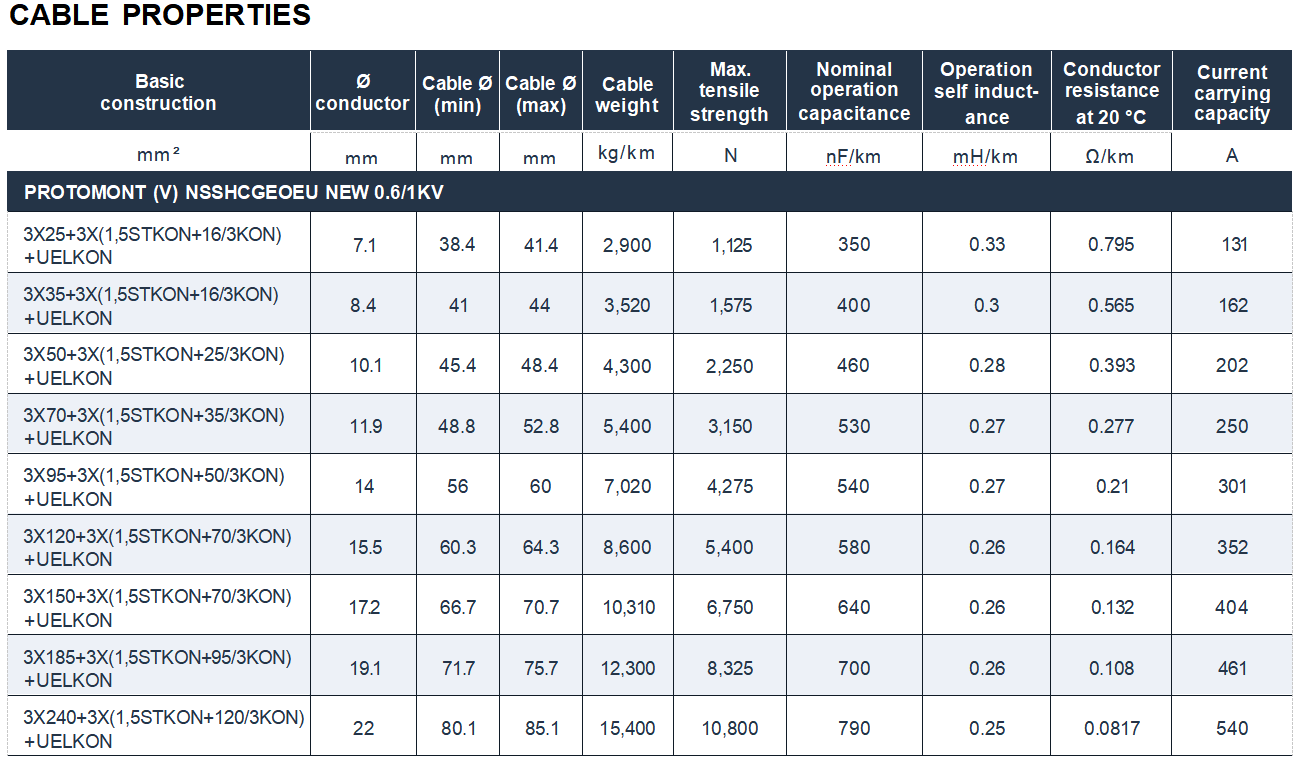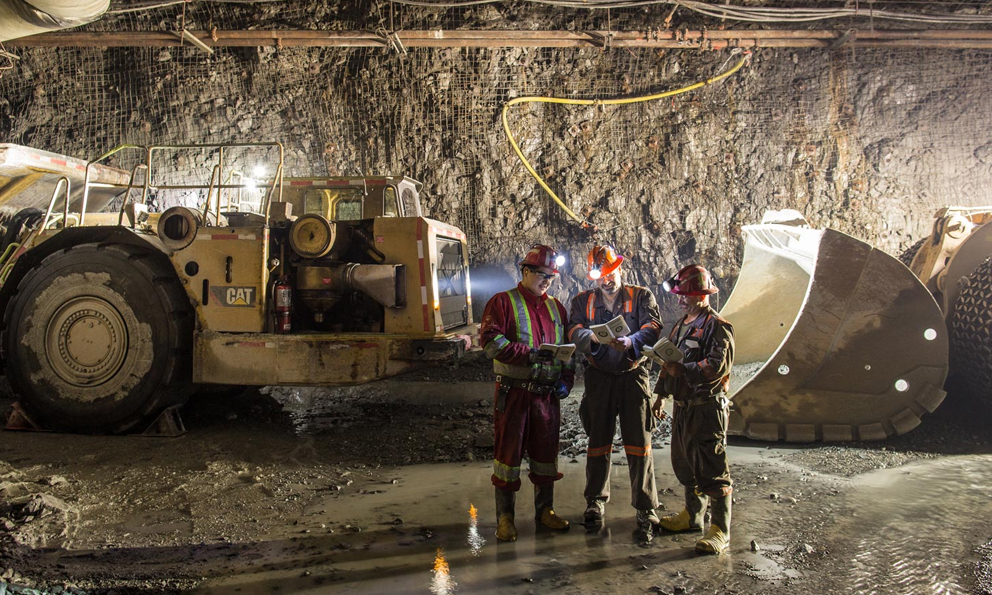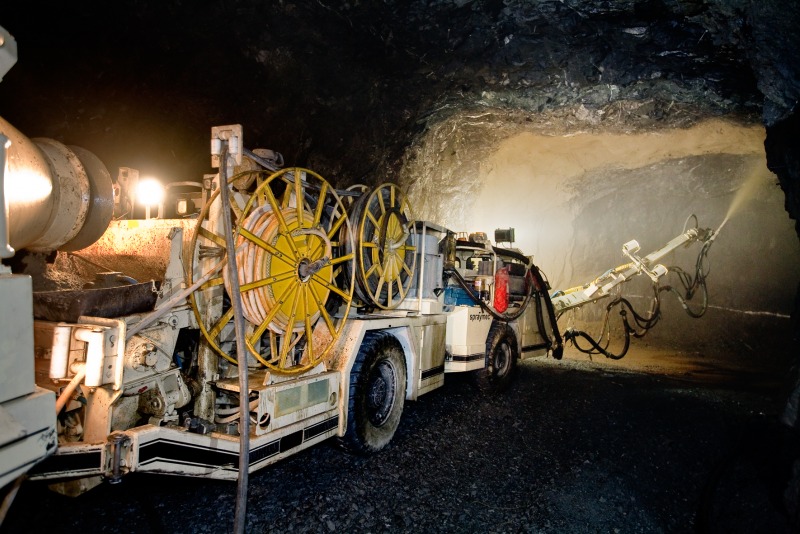📞+86 153 7530 2641 📧 hongjing.Wang@feichuncables.com

PROTOMONT V NSSHCGEOEU 0.6/1 kV Reeling Power Supply Cable for TBM in Underground Mines – High-Flexibility, Oil-Resistant, Temperature-Rated
High-performance PROTOMONT V NSSHCGEOEU 0.6/1 kV reeling power supply cable for TBM and tunnel construction in underground mines. Exceptional flexibility, oil and UV resistance, –40°C to +60°C
hongjing.Wang@Feichun
9/18/202511 min read


Introduction
Application Context: TBM and Tunnel Construction
The modern underground mining and tunneling industry relies heavily on sophisticated machinery to excavate through challenging geological formations. Tunnel Boring Machines (TBMs) represent the pinnacle of underground construction technology, capable of creating precise tunnels through rock, soil, and mixed ground conditions with unprecedented efficiency. These massive engineering marvels require robust, reliable power distribution systems to maintain continuous operation in some of the world's most demanding environments.
Underground mining operations present unique challenges for electrical infrastructure. The combination of confined spaces, extreme temperatures, chemical exposure, mechanical stress, and the constant movement of heavy machinery creates an environment where standard electrical cables simply cannot perform. This is where specialized reeling power supply cables become essential components of successful tunneling projects.
Importance of Reeling Power Supply Cables in Underground Mining
Reeling power supply cables serve as the critical lifeline connecting stationary power sources to mobile mining equipment such as TBMs, roadheaders, and other excavation machinery. These cables must withstand continuous coiling and uncoiling cycles while maintaining electrical integrity under extreme mechanical stress. The PROTOMONT V NSSHCGEOEU 0.6/1 kV reeling power cable represents a breakthrough in underground mine cable technology, specifically engineered to meet the demanding requirements of tunnel construction and underground mining operations.
The success of underground mining projects often depends on the reliability of power transmission systems. Equipment downtime due to cable failures can result in significant financial losses, project delays, and safety hazards. Therefore, selecting the appropriate reeling cable technology is crucial for ensuring operational continuity and maximizing return on investment in underground mining ventures.


Key Specifications of PROTOMONT V NSSHCGEOEU 0.6/1 kV
Rating and Test Voltage (U₀/U = 0.6/1 kV; Test Voltage 3 kV)
The PROTOMONT V NSSHCGEOEU operates with a nominal voltage rating of U₀/U = 0.6/1 kV (Um = 1.2 kV), making it suitable for medium-voltage power distribution in underground mining applications. The cable undergoes rigorous testing at 3 kV to ensure electrical integrity and insulation performance under extreme operating conditions. This voltage rating provides optimal power transmission for TBM operations while maintaining safety margins required in underground environments.
The test voltage specification of 3 kV demonstrates the cable's ability to withstand electrical stress beyond normal operating parameters, providing confidence in long-term reliability. This testing protocol ensures that the cable can handle voltage transients, surges, and other electrical anomalies commonly encountered in industrial mining environments.
Conductor and Insulation
The conductor design utilizes very finely stranded tinned copper construction classified as Class FS (Fine Stranded), providing exceptional flexibility while maintaining excellent electrical conductivity. The tinning process enhances corrosion resistance, extending cable life in harsh underground conditions where moisture and chemical exposure are constant concerns.
The insulation system employs high-grade EPR (Ethylene Propylene Rubber) technology using PROTOLON Special compound 3GI3, specifically formulated to provide superior electrical properties, thermal stability, and mechanical durability. EPR insulation offers excellent dielectric strength, low dielectric losses, and outstanding resistance to thermal aging, making it ideal for continuous-duty applications in underground mining environments.
Nominal Operation Capacity and Self-Inductance
The flexible oil-resistant tunnel boring machine power cable delivers reliable power transmission with optimized electrical characteristics designed for high-performance mining applications. The nominal operation capacitance ranges from 350 to 790 nF/km depending on conductor size, while operation self-inductance varies from 0.25 to 0.33 mH/km. These low values minimize voltage drops and power losses during transmission, ensuring efficient energy delivery to TBM drive systems and auxiliary equipment.
Current-Carrying Capacity (350 A–540 A)
The cable offers impressive current-carrying capacity ranging from 131 A for 25 mm² conductors up to 540 A for 240 mm² conductors. This robust ampacity rating ensures adequate power delivery for high-performance TBM operations, including main drive motors, cutterhead rotation systems, hydraulic pumps, and auxiliary equipment.
The high current capacity is achieved through optimized conductor design, superior insulation materials, and advanced thermal management characteristics. This allows the PROTOMONT V NSSHCGEOEU 0.6/1 kV cable for TBM reeling in underground mines to handle demanding power requirements while maintaining safe operating temperatures.
Mechanical Characteristics (Tensile Strength, Tensile Load)
Exceptional mechanical properties distinguish this cable from conventional power transmission cables. The reinforced construction incorporates steel Cu-tinned wire spinning that provides outstanding tensile strength ranging from 1,125 N for smaller cross-sections up to 10,800 N for larger configurations.
The cable is engineered with a permanent tensile strength rule of 15 N/mm² without compromising electrical performance or structural integrity. This mechanical robustness is essential for TBM applications where cables experience constant tension, compression, and lateral forces during excavation operations.


Environmental and Chemical Resistance
Temperature Ranges (Fixed: –40°C to +80°C; Flexible: –20°C to +60°C)
The –40°C to +60°C reeling cable for tunnel construction demonstrates exceptional thermal performance across a wide temperature range. For fixed installations, the cable operates reliably from –40°C to +80°C, while flexible reeling applications maintain full performance from –20°C to +60°C. The maximum conductor temperature is rated at 90°C for normal operation and 250°C for short circuit conditions.
This broad temperature range accommodates the extreme thermal conditions encountered in underground mining environments, from frozen ground conditions in arctic regions to high-temperature zones near geothermal activity. The cable's thermal stability ensures consistent electrical performance regardless of ambient temperature variations.
Oil, Fuel, Acid/Base, UV, and Ozone Resistance
Underground mining environments expose cables to various chemical hazards including hydraulic oils, diesel fuels, acids, bases, and other industrial chemicals. The PROTOFIRM polychloroprene (PCP) Special compound 5GM5 outer sheath provides exceptional resistance to these chemical attacks, significantly extending cable service life.
UV and ozone resistance capabilities protect the cable during surface handling, storage, and installation procedures. This comprehensive chemical resistance package ensures reliable performance in the harshest underground mining conditions where chemical exposure is unavoidable.
Flame Retardance (IEC 60332-1-2)
Fire safety is paramount in underground mining operations where escape routes are limited and ventilation systems may be compromised. The cable meets stringent flame retardance requirements according to IEC 60332-1-2 standards, providing critical fire safety protection.
The flame-retardant properties help prevent fire propagation along cable runs, buying precious time for evacuation and fire suppression systems to activate. This safety feature is essential for meeting underground mining safety regulations and protecting personnel and equipment.


Mechanical Performance
Flexibility for High-Speed Reeling and Extreme Bending
The cable's advanced construction provides exceptional flexibility essential for high-speed reeling applications common in TBM operations. The very finely stranded conductor design, combined with optimized EPR insulation and PROTOFIRM sheathing materials, allows for tight bending radii without compromising electrical or mechanical integrity.
This flexibility enables smooth operation of cable reel systems, reducing mechanical stress on both the cable and reeling equipment. The enhanced flexibility also facilitates installation in confined underground spaces where conventional rigid cables would be impractical.
Torsional Stress and Minimum Bending Radius (2.3×D at 5 N/mm²)
The minimum bending radius specification of 2.3×D at 5 N/mm² demonstrates the cable's exceptional flexibility characteristics. Additionally, a minimum distance of 20×D must be maintained with S-type directional changes to prevent mechanical damage. This tight bending radius allows for compact reel designs and efficient use of limited underground space.
Torsional stress resistance of +/- 25°/m ensures the cable can withstand the twisting forces encountered during reeling operations without developing internal damage or performance degradation. This mechanical robustness is crucial for maintaining long-term reliability in demanding TBM applications.
Abrasion and Impact Resistance
The robust PROTOFIRM outer sheath construction provides superior abrasion and impact resistance essential for underground mining environments. The cable can withstand contact with rough rock surfaces, mining equipment, and other mechanical hazards commonly encountered in tunnel construction.
Impact resistance protects the cable from damage due to falling rocks, equipment contact, and other mechanical impacts that are unavoidable in underground mining operations. This durability significantly reduces maintenance requirements and extends cable service life.
Construction Details
Conductor: Fine-Stranded Tinned Copper (Class FS)
The conductor utilizes Class FS very finely stranded tinned copper construction, representing the optimal balance between flexibility, conductivity, and durability. The fine stranding provides exceptional flexibility while maintaining excellent electrical characteristics required for high-performance power transmission with conductor resistance values ranging from 0.0817 Ω/km for 240 mm² to 0.795 Ω/km for 25 mm² conductors.
Tinning of individual copper strands provides enhanced corrosion resistance and improved strand-to-strand contact, reducing electrical losses and extending conductor life in harsh underground environments. This premium conductor technology ensures reliable power delivery throughout the cable's service life.
Insulation: EPR Rubber
High-performance EPR (Ethylene Propylene Rubber) insulation using PROTOLON Special compound 3GI3 provides superior electrical properties, thermal stability, and mechanical durability. EPR technology offers excellent dielectric strength, low dielectric losses, and outstanding resistance to thermal aging and environmental stress cracking.
The EPR insulation system maintains electrical integrity under extreme temperature cycling, mechanical stress, and chemical exposure conditions typical of underground mining applications. This advanced insulation technology is essential for ensuring long-term reliability and safety in demanding TBM operations.
Outer Sheath: Polychloroprene (PCP) PROTOFIRM Compound
The PROTOFIRM polychloroprene (PCP) Special compound 5GM5 outer sheath represents advanced polymer technology specifically formulated for underground mining applications. This specialized compound provides exceptional resistance to oils, fuels, acids, bases, UV radiation, and ozone exposure.
The PCP sheath also offers superior mechanical properties including abrasion resistance, impact resistance, and flexibility retention under extreme temperature conditions. This comprehensive protection package ensures reliable cable performance in the harshest underground mining environments.
Semi-Conductive Layers and Steel Cu-Tinned Reinforcement
Semi-conductive NBR easy-strip layers provide uniform electric field distribution around the conductor, eliminating stress concentrations that could lead to premature insulation failure. This advanced construction technique enhances electrical performance and extends cable service life.
Steel Cu-tinned wire reinforcement elements provide exceptional tensile strength and mechanical durability essential for reeling applications. The copper tinning prevents corrosion while maintaining electrical continuity of the reinforcement system. The cable also incorporates double concentric control/PE wire spinning in outer interstices for enhanced functionality.


Compliance and Standards
DIN VDE 0250-812, IEC 60228, VDE 0295
The PROTOMONT V NSSHCGEOEU complies with comprehensive international standards including DIN VDE 0250-812, IEC 60228, and VDE 0295. These standards ensure consistent quality, safety, and performance characteristics that meet or exceed industry requirements for underground mining applications.
Compliance with these rigorous standards provides confidence in cable reliability, safety, and long-term performance. The standards address critical aspects including conductor design, insulation properties, mechanical characteristics, and environmental performance requirements.
Chemical and Fire Performance Standards
Additional compliance with chemical resistance and fire performance standards ensures the cable meets stringent safety requirements for underground mining applications. These standards address critical safety aspects including flame retardance, smoke emission, and toxic gas generation during fire conditions.
Chemical resistance standards validate the cable's ability to withstand exposure to oils, fuels, acids, bases, and other industrial chemicals commonly encountered in underground mining environments.
Installation and Operation Guidelines
Reel Types (Mono-Spiral and Cylindrical)
The cable is compatible with both mono-spiral and cylindrical reel designs, providing flexibility in system configuration and installation requirements. Mono-spiral reels offer compact designs suitable for space-constrained applications, while cylindrical reels provide higher capacity and smoother cable handling characteristics.
Proper reel selection depends on specific application requirements including cable length, installation space, and operational parameters. The cable's exceptional flexibility accommodates both reel types without compromising performance or service life.
Application in Cable Protection Chains
Cable protection chains provide additional mechanical protection in applications where extreme abrasion or impact conditions exist. The underground mine cable design accommodates installation within protection chain systems while maintaining full electrical and mechanical performance.
Protection chains are particularly beneficial in applications where the cable may contact rough surfaces, sharp edges, or other mechanical hazards that could damage conventional cable constructions.
Recommended Maintenance Practices
Regular inspection and maintenance protocols ensure optimal cable performance and extend service life. Recommended practices include visual inspection for physical damage, electrical testing to verify insulation integrity, and mechanical inspection of connections and terminations.
Proper storage, handling, and installation procedures are essential for maintaining cable performance and preventing premature failure. Training programs should ensure personnel understand proper cable handling techniques and safety procedures.
Benefits for TBM and Tunnel Applications
Enhanced Operational Uptime
The exceptional reliability and durability of the PROTOMONT V NSSHCGEOEU significantly enhance operational uptime in TBM and tunnel construction applications. Reduced cable failures translate directly to increased productivity and project efficiency.
The cable's robust construction and comprehensive environmental resistance ensure reliable performance under the demanding conditions typical of underground mining operations. This reliability reduces unplanned maintenance and minimizes project delays due to equipment failures.
Reduced Maintenance Costs
Superior construction quality and environmental resistance characteristics significantly reduce maintenance requirements and associated costs. The cable's durability minimizes replacement frequency and reduces inventory requirements for spare parts.
Lower maintenance costs contribute to improved project economics and higher return on investment for underground mining operations. The extended service life also reduces disposal costs and environmental impact associated with cable replacement.
Optimal Performance in Harsh Underground Conditions
The comprehensive environmental resistance package ensures optimal performance in harsh underground conditions including extreme temperatures, chemical exposure, mechanical stress, and electrical transients. This performance consistency is essential for maintaining operational efficiency in demanding mining environments.
The cable's ability to maintain performance under extreme conditions provides confidence in project success and reduces risk associated with equipment failures and project delays.
Conclusion
Summary of PROTOMONT V NSSHCGEOEU Advantages
The PROTOMONT V NSSHCGEOEU 0.6/1 kV reeling power supply cable represents a significant advancement in underground mining cable technology. Key advantages include exceptional flexibility for reeling applications, comprehensive environmental resistance, high current-carrying capacity, and robust mechanical construction designed specifically for TBM and tunnel construction applications.
The cable's advanced construction incorporating Class FS fine-stranded tinned copper conductors, EPR insulation, and PROTOFIRM PCP outer sheath provides unmatched performance in demanding underground mining environments. Compliance with international standards ensures consistent quality and safety performance.
Ideal Use Cases: TBM, Roadheaders, and Tunnel Construction
The PROTOMONT V NSSHCGEOEU is ideally suited for TBM operations, roadheader applications, and general tunnel construction projects where reliable power transmission is essential. The cable's exceptional flexibility, environmental resistance, and mechanical durability make it the preferred choice for demanding underground mining applications.
Whether powering massive TBM systems, roadheader excavation equipment, or auxiliary mining machinery, this advanced cable technology provides the reliability, safety, and performance required for successful underground mining operations. The comprehensive specification package addresses all critical requirements for modern tunnel construction and underground mining applications.
Frequently Asked Questions
Q: What are the key advantages of PROTOMONT V NSSHCGEOEU over standard mining cables?
A: The PROTOMONT V NSSHCGEOEU offers superior flexibility with a minimum bending radius of 2.3×D at 5 N/mm², exceptional temperature performance (–40°C to +60°C for flexible applications), comprehensive chemical resistance including oil and fuel resistance, and current-carrying capacity up to 540 A for 240 mm² conductors. The very finely stranded tinned copper Class FS conductor and PROTOFIRM PCP outer sheath make it ideal for demanding TBM reeling applications where standard cables would fail.
Q: How does the cable handle continuous reeling cycles in TBM operations?
A: The cable's Class FS very finely stranded tinned copper conductor and advanced EPR insulation with PROTOLON Special compound 3GI3 provide exceptional flexibility for continuous reeling operations. The steel Cu-tinned wire reinforcement and PROTOFIRM PCP outer sheath ensure mechanical durability under constant coiling and uncoiling cycles, with torsional stress resistance of +/- 25°/m, significantly extending service life compared to conventional cables.
Q: What maintenance is required for optimal cable performance?
A: Regular visual inspections for physical damage, electrical testing to verify insulation integrity, and mechanical inspection of connections and terminations are recommended. The cable's robust construction with EPR rubber insulation using Special compound GM1b and PROTOFIRM outer sheath minimizes maintenance requirements. Proper storage and handling procedures are essential, and personnel should be trained in correct cable handling techniques to prevent damage and ensure safety.
Q: Can the cable operate in extremely cold underground conditions?
A: Yes, the PROTOMONT V NSSHCGEOEU is rated for operation down to –40°C in fixed installations and –20°C in flexible reeling applications. The maximum conductor temperature reaches 90°C for normal operation and 250°C during short circuit conditions. The advanced EPR insulation and PCP sheath materials maintain electrical and mechanical performance even in extreme cold conditions commonly encountered in underground mining operations.
Q: What safety certifications does the cable meet?
A: The cable complies with comprehensive international standards including DIN VDE 0250-812, IEC 60228, VDE 0295 for conductors, and DIN VDE 0298-4 for electrical parameters. It also meets flame retardance requirements according to IEC 60332-1-2, ensuring fire safety compliance for underground mining applications. Additional certifications include BAS Bosnia-Herzegovina, EAC, MSHA P-07-KA140034, and MA China approvals, ensuring compliance with stringent international safety regulations where safety requirements are critical.
How to Reach Us
Get in Touch
SiteMap
Product Catalogue
Reeling Cable
Festoon Cable
Shore Power Cable




Scan to add us on WeChat
